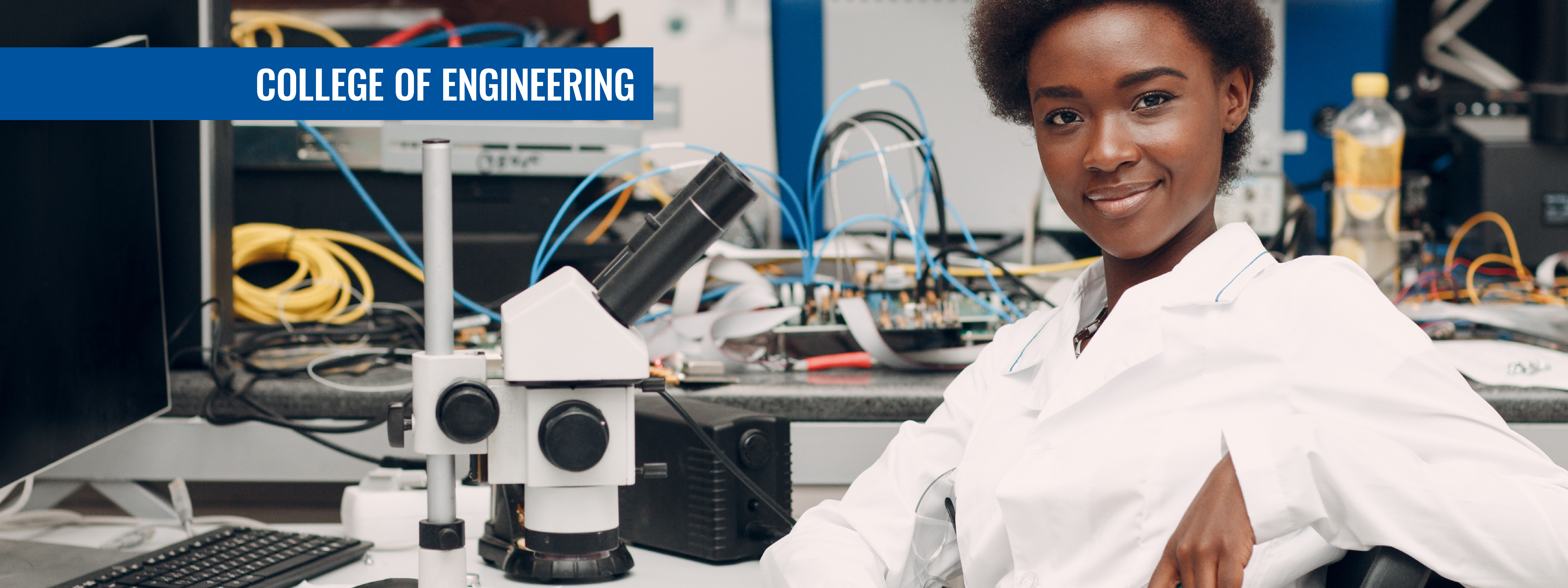- Home >
- College of Engineering
- > Core Courses
Core Courses
Requirements Listing
The following courses encompass the core requirements for an Engineering degree:
ENGR 1020, Freshman Engineering Seminar (1). An overview of the engineering programs and profession; Engineering tools and problem solving techniques; Use of codes and standards; Engineering ethics and communication.
ENGR 1151 Computer Engineering Graphics and Analysis 1(0,3). The course is designed to develop the fundamental skills of graphics communication by manual and computer means. Sketching techniques to develop orthographic and pictorial graphics skills, standard technical drawing methods, dimensioning techniques, working drawings development skills, and lettering capability will be the fundamental focus of the course.
ENGR 2000, ENGR 2001 Circuits I and Lab (3), (1). Fundamental concepts of charge, current, voltage and power; passive and active circuit elements, phasors and impedance; mesh and nodal analysis; Thevenin’s and Norton’s Theorems; superposition; source transformations, natural and forced response of RL, RC, and RLC circuits average and effective values of periodic wave form; polyphase circuits. Prerequisites: ENGR 2230, MATH 2110, PHYS 2120, Co requisite MATH 3120.
ENGR 2010 Thermodynamics 3(3,0). An introduction to the nature and domains of thermodynamics; the Zeroth Law; properties and states of a pure substance; work and heat; the First Law applied to both open and closed systems; general observations and statements of the Second Law; the inequality of Clausius and entropy changes for closed and open system; ideal gases. Prerequisites: PHYS 2110.
ENGR 2110 Statics 3(3,0). Statics of particles; statics of rigid bodies in two and three dimensions; centroids and center of gravity; friction and moment of inertia. Prerequisites: PHYS 2110.
ENGR 2120 Dynamics 3(3,0). Study of the kinematics and kinetics of particles and rigid bodies; Principle of work and energy; Principle of impulse and momentum. Prerequisite: ENGR 2110.
ENGR 2130 Mechanics of Materials (3). Concepts of stress and strain, stress-strain relationships, shear and moment diagrams, shear and moment by integration, torsion in shafts, bending and axial loads on determinate beams, Stress Transformation. Prerequisite: ENGR 2110.
ENGR 2131 Mechanics of Materials Lab (1). A laboratory based on ENGR 2130 lecture material, one 3-hour lab per week. Co-requisite: ENGR 2130.
ENGR 2230 Engineering Computer Programming (3). An introduction to programming using the C++ language in the solution of engineering problems; Students should have basic experience using a computer but no prior programming is required. Topics include sequential, decision and repetition control statements, top-down program development and programming style, functions, basic data structures, arrays, an introduction to object technology, object-oriented programming and classes. Prerequisites: MATH 1910, ENGR 1020.
ENGR 2250 Transport Phenomena 3(3,0). Unified treatment of the principles of thermodynamics, heat transfer and fluid mechanics. Energy, analysis and the first and the second law of thermodynamics, steady state and transient heat conduction, convection and the thermal radiation process, fundamentals of fluid flow. Prerequisites: PHYS 2120.
ENGR 3200 Introduction to Design 3(3,0). A course which considers the engineering design process as an interdisciplinary activity. Engineering Statistics, economic decision making and the design process are introduced as is oral and written technical reporting. A comprehensive design project is required as is a technical report and an oral report of the design.
ENGR 3300 Materials Science 2(2,0). An introductory course on properties and selection of materials covering atomic structure and bonding; crystal structures; crystalline and non-crystalline solids; mechanical properties of materials; polymers; phase diagrams; engineering alloys; ceramics; composite materials; and electrical, optical, and magnetic properties of materials. Prerequisites: CHEM 1110, PHYS 2120.
ENGR 3400 Numerical Analysis 3(3,0). Numerical solution of the system of linear and non-linear equations; numerical differentiation and integration; numerical solution of ordinary and partial differential equations; curve fitting; regression analysis and probability. Prerequisites: MATH 3120, ENGR 2230.
ENGR 4201 Engineer in Training Laboratory 0(0,3). A course designed to prepare students for the Fundamentals of Engineering (FE) Examination, which is a partial requirement for obtaining license as a professional engineer. Prerequisite: Senior Standing.
ENGR 4500 Capstone Design Project I (1,0). An engineering capstone design project I leading to completion of the project in ENGR 4510. A written report and an oral defense of the proposed design project are required. Prerequisites: Graduating Senior, ENGR 3200.
ENGR 4510 Capstone Design Project II 1(1,0). A continuation of capstone design project I leading to completion of the project. A written report and an oral defense of the project are required. Prerequisite: ENGR 4500.
ENGR 4900 Professional Development Seminar 1(1,0). Discussion of case studies, professionalism, professional ethics, professional development activities required in industry. Prerequisite: Graduating Senior.


